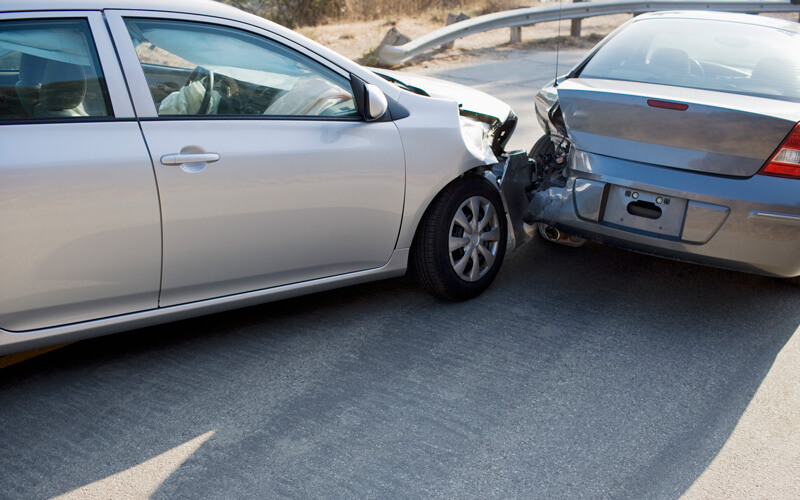Advice on How to Handle a Car Accident
Auto accidents are frightening and stressful. When you’re involved in a car crash, sometimes it’s hard to remember what to do. Bookmark this page on your phone, so you’ll have it to refer back to, should you need it.
-
First off, always stop.
Legally you are obligated to stop, even if it was a minor collision, and you don’t think there is any damage.
If your car isn’t blocking traffic, put it in park, turn on your emergency blinkers, turn off the engine, and leave it where it is. If you are blocking traffic, pull onto the shoulder. If your car doesn’t move, and it’s in a position where it may be hit by oncoming traffic, make sure that you and any passengers are out of the car and someplace safe.
If anyone is seriously injured, call 911 and request an ambulance immediately.
-
Do not apologize or admit guilt.
Even if you suspect that this accident was your fault, don’t say so. Try to say as little as possible to anyone on the scene other than the police.
Exchange insurance information with the other driver.
Usually it’s easiest to take a picture of their insurance card with your phone. You should also take a picture of the other driver’s license plate and of any damage to either car. In addition to the other driver’s insurance information, make sure you get their name, address, phone number, and vehicle VIN number.
Even—especially— if the other driver asks to handle things without insurance, make sure to get all of their information, including their insurance information. If they refuse to show you any insurance information, mention this to the police when they arrive.
If any witnesses pull over, get their contact information.
-
Don’t allow anyone to take a photo of your driver’s license.
You don’t want to put yourself at risk for identity theft. Instead, offer to write down your name, address and phone number.
-
Call the police.
In Colorado, you legally need an accident report, even if the wreck was minor.
If the weather is particularly bad, your area may be under an “accident alert,” which means the police will only respond to an accident in the case of a severe injury or fatality, disabled vehicles, damage to public property (such as a guardrail), or if alcohol or drugs are involved. But call the police regardless, and they will tell you if your area is under an accident alert.
Whether or not there is an accident alert, you are required to file an accident report as soon as possible.You can report your accident online.
-
Call your insurance company.
It’s good to do this while you’re waiting for the police to arrive, because it keeps you occupied. This way, you won’t be tempted to talk out your post-accident jitters with the other driver and in the process, inadvertently say something that could be construed as admitting guilt. Sometimes you may need to hang up to speak with the police. If that happens, call your insurance company back as soon as possible. A representative will talk you through filing a claim.
When the police arrive, show them your insurance card, answer their questions, and ask how to get a copy of the accident report. Make sure to get the responding officer’s name, badge number and contact info.
-
If you don’t know whether or not you’re injured, say that you’re not sure when an officer asks.
If the impact was very jarring, you may not know if you are injured until a few hours later.
-
If your car doesn’t move, call a tow truck.
And if the police call one for you, make sure you get the name of the tow company. Some insurance policies include roadside assistance. When you speak to your agent, ask if this is covered in your policy and if there is a specific number you should call.
-
Use your phone to voice record your version of what happened, or write down what happened as soon as possible.
(But do this after you’ve moved your car someplace safe, such as a parking lot.) Your insurance company will ask you for this information later, and it’s helpful to get it down while it’s fresh.
Information you need to include:
— Where the accident happened. (Be as specific as possible. Include the exit number or mile marker, a nearby cross street, etc.)
— What time the accident happened.
— If you had any passengers.
— If the other driver had any passengers.
— If you were wearing a seatbelt.
— The direction you were traveling.
— The direction the other car was traveling.
— Weather and visibility conditions.
— Road conditions. (Was the road wet? Icy? Curvy? Busted?)
— How the collision occurred. -
If you are hurt, see a doctor as soon as possible.
If the other driver is at fault and you wait on this, you are less likely to receive any sort of medical compensation.
Make sure that you’re fully covered in the event of an auto accident, and that your coverage includes roadside assistance and protection against uninsured motorists. Talk to a Farm Bureau agent today.
If you are already insured by Colorado Farm Bureau Insurance call 1-800-315-5998 or login to your account to report a claim.
Sources: Colorado.gov, Colorado DMV

